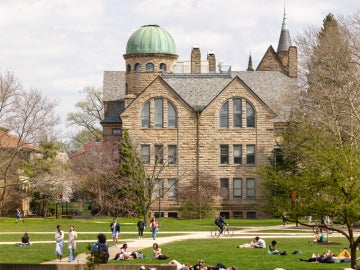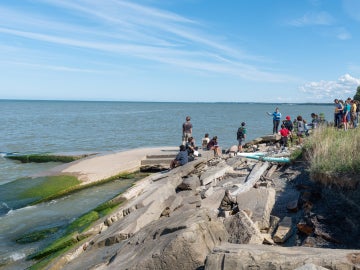World Renowned Geochemist Delivers National Academy of Sciences Lectures at Oberlin College
November 11, 2013
Communications Staff
What are the causes of abrupt climate change? What is behind the rapid melting of ice sheets at the end of glacial cycles? What role do humans play in climate change?
R. Lawrence Edwards will address these questions when he delivers the National Academy of Sciences’ Day Prize Lecture Series at Oberlin College on November 14, 15, and 21.
An isotope geochemist, Edwards champions cave deposits as recorders of historic and prehistoric climate. The Robert D. and Carol C. Gunn Professor and Distinguished McKnight University Professor in the University of Minnesota’s earth sciences department, he and his large group of international collaborators are currently working on piecing together hundreds of thousands of years of Asian monsoon history from caves in China. Using innovative strategies, he relates his cave climate histories to those from ocean sediments and from ice cores, thereby establishing patterns of changing climate in time and space. Some of his research assesses the relationship between climate change and cultural history, drawing plausible links between global shifts in rainfall patterns and major cultural changes. His cave records, which cover the last several centuries, contain some of the strongest evidence yet for human-induced climate change.
“Modern data show quite clearly that the climate is changing, and there is broad scientific consensus that human activities are responsible for much of the change that is happening right now,” says F. Zeb Page, associate professor of geology at Oberlin.
“We know that over geologic time the Earth's climate has changed quite a bit without human help. To understand our part in the current climate-change predicament, we must establish a baseline of natural change. Professor Edwards’ work allows us to precisely determine the age of thinly layered limestone found in cave deposits back 700,000 years. These rocks serve as a detailed record of climate and can be tied to other climate-change drivers such as changes in the Earth's orbit.”
Edwards will present three lectures at Oberlin under the auspices of the National Academy of Sciences’ (NAS) Arthur L. Day Prize Lecture Series. The NAS awards the Day Prize every three years to “a scientist making lasting contributions to the study of the physics of the Earth and whose lectures will provide solid, timely, and useful additions to the knowledge and literature in the field.”
Edwards’ says he chose Oberlin—rather than a large research university—as the site for his lectures because he “thought the topic of climate history would be of interest to undergraduates and appropriate for presentation at the undergraduate level.
“There are several strong geology departments at small liberal arts colleges, including Oberlin’s department, and Oberlin was among the schools I considered on the basis of the strength of its program. I also have family ties to Oberlin. My mother, who was born and raised in China, was the Dean of Students for the Chengdu campus of the Oberlin-in-China program at the time of the Communist takeover in 1949 and early 1950. My daughter attends Oberlin now.”
All lectures take place on Oberlin’s campus and are free and open to the public.
Thursday, November 14
Deciphering Climate Change from Underground: The Timeline for Cave Climate Records
7:30 pm • Norman C. Craig Lecture Hall • Science Center
119 Woodland Street, Oberlin, OH 44074
Friday, November 15
Deciphering Climate Change from Underground: Stalagmites as Scribes of Climate History
12:15 pm • Severance Hall • Room 108
120 West Lorain Street, Oberlin, OH 44074
Thursday, November 21
Deciphering Climate Change from Underground: Monsoons, Ice Ages, and Abrupt Climate Change
7:30 pm • Nancy Schrom Dye Lecture Hall • Science Center
119 Woodland Street, Oberlin, OH 44074
You may also like…
Oberlin Launches Critical AI Studies Minor in Fall 2026
With a solid foundation in both science and the humanities, this minor ensures students to understand and be able to analyze the ethical, cultural, environmental, political, economic, technological, and labor effects of AI.
Research Roundup
Every day, Oberlin’s faculty and students produce scholarly work that uncovers new insights into how we understand the world, particularly in the areas of sustainability and the environment.
Three Things with Jillian Scudder
Oberlin’s astrophysicist-author shines a light on our dark universe.


